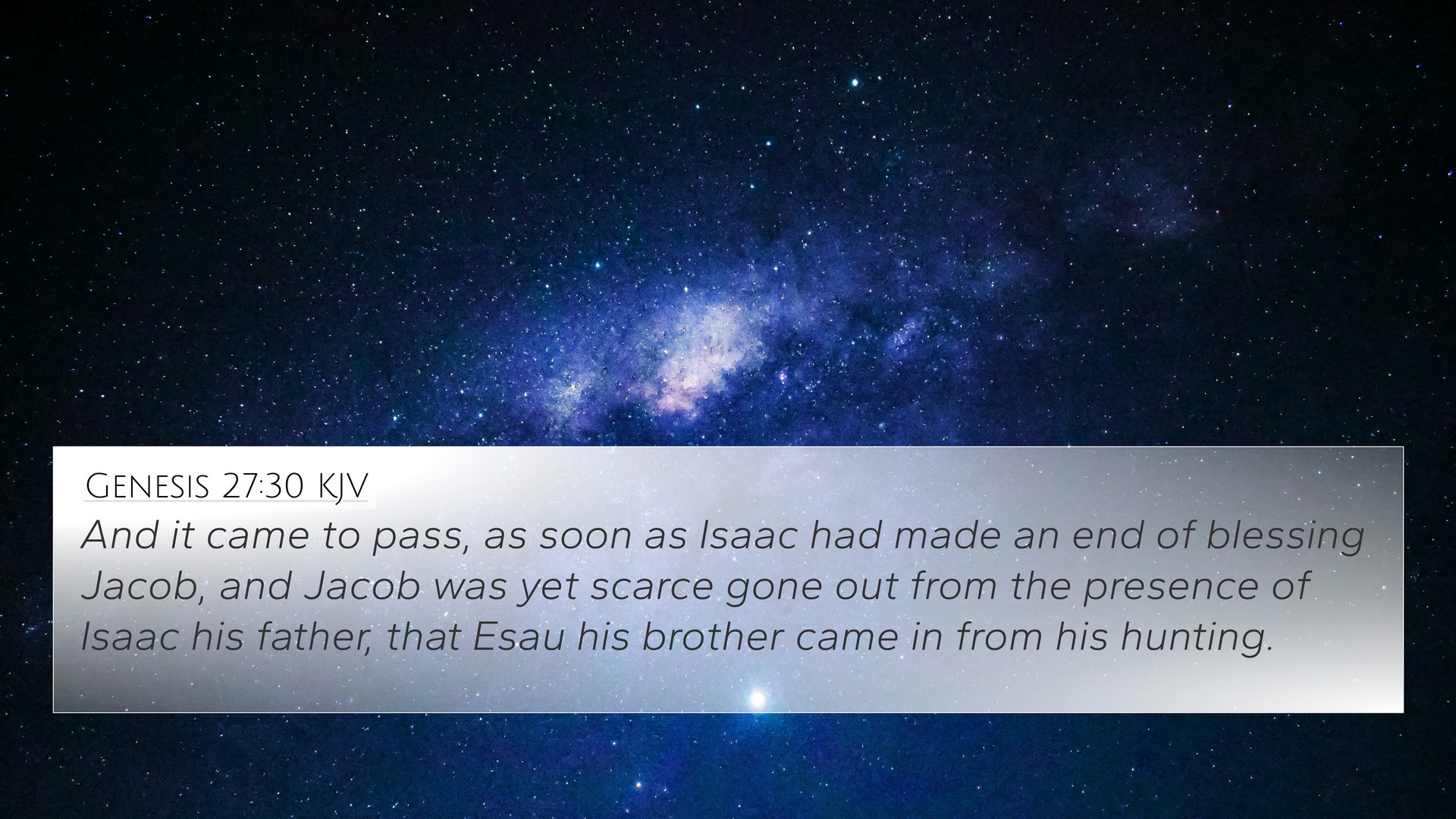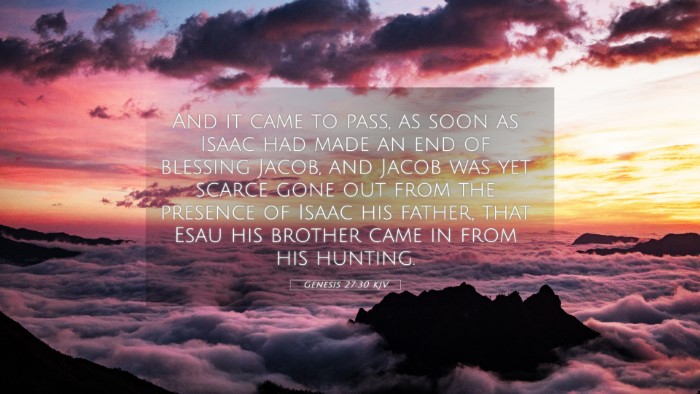Understanding Genesis 27:30
Genesis 27:30 recounts the moment when Jacob receives the blessing intended for Esau from their father Isaac. This pivotal event not only highlights themes of deception and family dynamics but also sets the stage for many theological discussions throughout the Bible. By examining public domain commentaries, we can draw a deeper understanding of this verse.
Verse Context and Significance
This verse occurs after Jacob, with the help of his mother Rebekah, deceives his father Isaac into blessing him instead of his elder brother, Esau. The implications of this blessing and the deception that accompanied it resonate throughout the subsequent narratives in Scripture.
Commentary Insights
-
Matthew Henry:
Henry emphasizes the moral implications of Jacob's deception. He suggests that while Jacob's actions were deceitful, they were also a part of God's divine plan. The struggle for the blessing mirrors the larger theme of God's sovereignty over human affairs, where even flawed actions can lead to the fulfillment of His will.
-
Albert Barnes:
Barnes notes the familial tension generated by this blessing. He points out that Isaac's blindness and old age serve as a metaphor for spiritual blindness, showing how even the patriarchs could err in their judgments. This invites believers to examine their spiritual insight and to remain vigilant against deception.
-
Adam Clarke:
Clarke highlights the prophetic nature of the blessing, linking it to future events in the nation of Israel. He discusses how the choice of Jacob over Esau establishes a theme of divine election that is explored throughout Scripture. Jacob, despite his shortcomings, becomes an instrument of God's promise.
Thematic Connections
Genesis 27:30 is deeply interconnected with various Biblical themes and events, and several cross-references can be made:
-
Hebrews 12:16-17: These verses discuss the consequences of Esau's actions, emphasizing the importance of valuing spiritual blessings.
-
Malachi 1:2-3: The Lord's declaration of love for Jacob and hatred for Esau highlights the theme of divine choice.
-
Romans 9:10-13: Paul references the choice of Jacob over Esau to illustrate God's sovereign election.
-
Matthew 1:2-3: The genealogy of Jesus includes Jacob, reaffirming the significance of this blessing in redemptive history.
-
Genesis 25:23: A prophecy given to Rebekah about the two sons foreshadows the events of Isaac's blessing.
-
Genesis 27:28-29: The actual blessing where Jacob receives the assurances of dominion and prosperity, creating a narrative tension with Esau.
-
1 Timothy 6:12: The call to fight the good fight of faith resonates with Jacob's struggle for his rightful place in God's plan.
Inter-Biblical Dialogue
The story of Jacob and Esau invites readers to engage in inter-Biblical dialogue. Jacob's later transformation into Israel demonstrates a journey of redemption and change. The entire saga speaks to themes of conflict, divine purpose, and the complexity of human relationships in light of God's overarching plan.
Tools for Cross-Referencing
For those interested in exploring similar themes and connections, various tools and resources can aid in cross-referencing:
- Bible concordances for thematic searches.
- Bible cross-reference guides that detail connections across testaments.
- Digital Bible reference resources for interactive study.
- Cross-reference systems in study Bibles to enhance understanding.
- Comprehensive materials for deepening Biblical knowledge.
- Methods for cross-referencing Psalms with New Testament teachings.
Conclusion
Genesis 27:30 is not merely a narrative of deception but a profound piece of the larger tapestry of Scripture that speaks to God's sovereignty, human fallibility, and the unfolding plan of redemption. By leveraging cross-references and exploring commentaries, readers can gain a richer understanding of this critical verse and its implications throughout the Bible.


